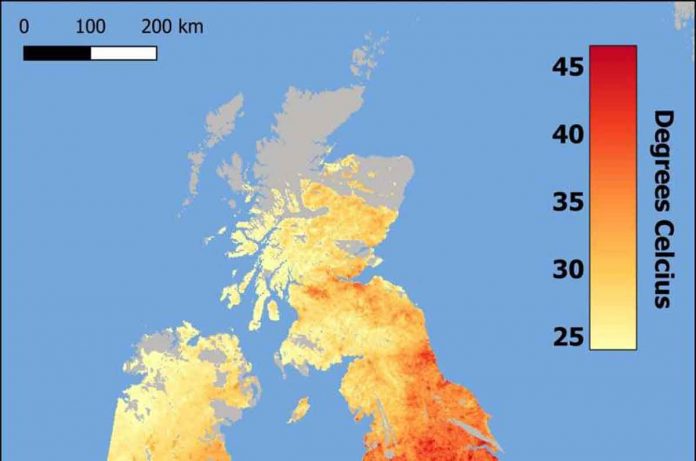Earth Observation (EO) experts at the University of Leicester have used data from space to reveal the UK’s record-breaking heatwave.
Leicester scientists affiliated with the National Center for Earth Observation (NCEO), headquartered at Space Park Leicester, have mapped measurements of land surface temperature, peaking at 52°C, as measured by a pair of Sentinel-3 satellites in orbit more than 800 kilometres (500 miles) above Earth.
Their map depicts the temperature of the Earth’s surface at 10:20 a.m. on Monday, as measured by the satellites’ Sea and Land Surface Temperature Radiometers (SLSTR). The European Space Agency is in charge of the satellites (ESA).
Although land surface temperature is distinct from ambient air temperature, the two are inextricably linked. The warmth rising from the Earth’s surface influences (and is influenced by) our planet’s weather and climate patterns.
“Space-based observations of the temperature of the land’s surface offer unparalleled knowledge of the spatial structure of these heatwave events,” said Dr. Darren Ghent, NCEO Leader and Research Fellow for Land Surface Temperature.
The map depicts the hottest land surface temperatures in and around London, as well as other major towns and cities in both the south east and the Midlands.
The increased concentration of concrete, buildings, and other dense materials absorbs and retains heat at a higher rate than natural land cover, resulting in urban “heat islands.”
To monitor and understand global and regional changes, the NCEO processes and analyses massive amounts of data generated by satellites, aircraft, and ground-based assets.
The NCEO, which is headquartered at Space Park Leicester, is made up of a distributed team of more than 100 scientists from UK universities, including many from the University of Leicester.

